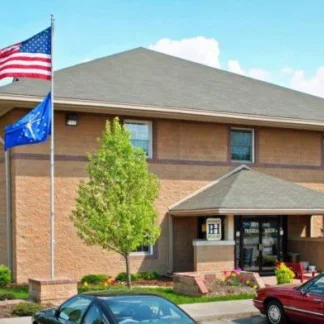Veteran Health Indiana - Richard L. Roudebush VA Medical Center
Richard L. Roudebush VA Medical Center is located in Indianapolis, Indiana. Rich...
Progress House is the state of Indiana's oldest and largest recovery residence. Progress House was founded in 1961 by a group of men and women who had recovered from the disease of alcoholism, and who recognized a need for a recovery setting in Indianapolis.
It isn’t about where your recovery journey begins, but where you’re going.
Aspire Indiana Health approaches the treatment of substance use disorder with a philosophy of support, not stigma.
Aspire and Progress House have joined forces to offer an evolution of addiction treatment, which we refer to as the Whole Health Recovery Continuum (WHRC).
Instead of scattering the pieces to the recovery puzzle and expecting people to find them, the WHRC brings everything needed for a highly-effective recovery program, including a stable, safe place to live.
In this continuum of care, there is no right or wrong place to enter treatment. Some may begin their recovery journey at a high-intensity treatment center, like our Mockingbird Hill Recovery Center in Anderson.
Others might go straight to a recovery residence like Progress House in Indianapolis, where they can enjoy peer support while gaining the skills and stability they need to reclaim their lives and then onto the Next Steps housing program, a network of semi-independent recovery homes.
Some people may able to receive addiction treatment strictly on an outpatient basis at one of our Central Indiana clinics.
Wherever they enter the continuum, they’ll receive the comprehensive help they need. Primary medical care. Behavioral health therapy. Peer support groups, including 12 Step Recovery Programming. Medication-Assisted Treatment (MAT). Individual case management. Education and job training. And more services — all in one seamless continuum.
For some people, they may naturally progress from a high-intensity treatment facility through a recovery residence to semi-independent recovery housing. Others might start and leave from the same point in the continuum. It all depends on the nature of their individual needs to chart the path their recovery journey will take.
But the goal is the same for everyone: to reach a stage of long-term recovery where the disease of substance use disorder (SUD) is no longer controlling their lives.
Contact us for more information: (317) 637-9816

Connect with Aspire Indiana Health - Progress House by calling their admissions team directly.
(317) 637-9816 Website Get DirectionsThe Joint Commission, formerly known as JCAHO, is a nonprofit organization that accredits rehab organizations and programs. Founded in 1951, the Joint Commision's mission is to improve the quality of patient care and demonstrating the quality of patient care.
Joint Commission Accreditation: Yes
Group therapy is any therapeutic work that happens in a group (not one-on-one). There are a number of different group therapy modalities, including support groups, experiential therapy, psycho-education, and more. Group therapy involves treatment as well as processing interaction between group members.
In individual therapy, a patient meets one-on-one with a trained psychologist or counselor. Therapy is a pivotal part of effective substance abuse treatment, as it often covers root causes of addiction, including challenges faced by the patient in their social, family, and work/school life.
In individual therapy, a patient meets one-on-one with a trained psychologist or counselor. Therapy is a pivotal part of effective substance abuse treatment, as it often covers root causes of addiction, including challenges faced by the patient in their social, family, and work/school life.
Richard L. Roudebush VA Medical Center is located in Indianapolis, Indiana. Rich...
Indiana University Health is Indiana’s largest comprehensive health system and i...
Eskenazi Health Center Forest Manor is a public rehab located in Indianapolis, I...
Community Health Network - Warren Township offers the most comprehensive behavio...